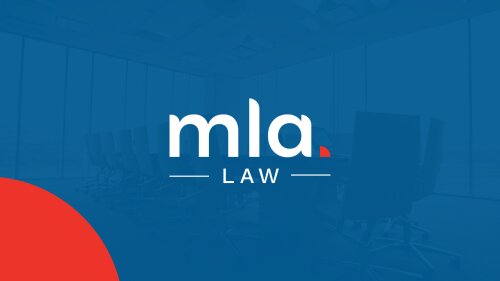Best Tax Lawyers in Greater Sudbury
Share your needs with us, get contacted by law firms.
Free. Takes 2 min.
List of the best lawyers in Greater Sudbury, Canada
About Tax Law in Greater Sudbury, Canada
Tax law in Greater Sudbury, Ontario, is governed primarily by federal statutes such as the Income Tax Act of Canada as well as Ontario provincial tax laws, including the administration of sales taxes like HST. The Canada Revenue Agency (CRA) oversees the assessment and collection of federal and provincial income taxes, while the Ontario Ministry of Finance plays a role in provincial taxes. Residents and businesses in Greater Sudbury are required to comply with these tax regulations, file annual tax returns, and may be subject to audits or disputes. Understanding local nuances, deductions, credits, and property tax rules is crucial for proper compliance.
Why You May Need a Lawyer
There are several situations where seeking professional legal advice on tax matters in Greater Sudbury can save time, money, and unnecessary stress. Common reasons include:
- Tax Audits: If the CRA or Ontario Ministry of Finance audits your personal or business taxes, a lawyer can help protect your rights and ensure compliance.
- Tax Disputes: Disagreements over amounts owed, penalties, or interpretations of tax law may require negotiation or formal appeals.
- Business Tax Planning: Entrepreneurs and business owners can benefit from legal advice on corporate structuring and tax minimization strategies.
- Personal Tax Planning: Large life changes such as marriage, divorce, inheritance, or selling property can have significant tax implications.
- Voluntary Disclosures: If you have unreported income, a lawyer can help you participate in CRA voluntary disclosure programs to minimize penalties or prosecution.
- Estate Planning: Advice on wills, trusts, and succession can reduce tax burdens on heirs.
Local Laws Overview
Residents and businesses in Greater Sudbury are subject to the same tax regimes as those elsewhere in Ontario, with some considerations for local circumstances:
- Income Tax: Individuals and corporations both pay federal and Ontario provincial income tax. Rates are progressive for individuals.
- Sales Taxes: Ontario uses the Harmonized Sales Tax (HST), which is a combination of federal GST and provincial PST, currently at 13%.
- Property Taxes: Administered by the City of Greater Sudbury and based on the assessed value of real property. These can vary by location within the city and type of property (residential, commercial, industrial).
- Business Taxes: In addition to federal and provincial corporate taxes, certain businesses may be subject to additional levies depending on their activities, locations, and size.
- Mining Taxes: Given Sudbury’s strong mining sector, special provincial mining taxes and royalties may apply to mining companies.
- Tax Incentives: Various local, provincial, and federal incentives exist for business development, environment initiatives, and certain industries.
Frequently Asked Questions
What is the tax filing deadline for individuals in Greater Sudbury?
The deadline for most individuals is April 30 each year for the previous calendar year. If you or your spouse/common-law partner are self-employed, you have until June 15 to file, though any balance owed must still be paid by April 30.
Do I need to collect and remit HST if I have a small business in Greater Sudbury?
If your business has $30,000 or more in gross revenues in a single calendar quarter or over the last four consecutive quarters, you must register, collect, and remit HST to the CRA.
What should I do if I’m being audited by the CRA?
If you are contacted about an audit, consult a tax lawyer or qualified accountant as soon as possible. They can help you prepare documents, assist with communications, and protect your rights throughout the process.
How are property taxes calculated in Greater Sudbury?
Property taxes are based on the Municipal Property Assessment Corporation’s assessed value of your home or business and the rates set by the City of Greater Sudbury. These funds support local services like schools, fire, police, and roads.
Are there any local tax credits for Sudbury residents?
Ontario and federal tax credits are available, such as the Ontario Trillium Benefit, GST/HST credit, and others. The City itself may offer property tax relief for eligible seniors or low-income residents.
What is the corporate tax rate for businesses in Sudbury?
Combined federal and Ontario small business income tax rates are typically lower for the first $500,000 of active business income. The general corporate rate varies but consult a professional to ensure the correct rates are applied to your situation.
How are mining companies taxed in Greater Sudbury?
In addition to general corporate income taxes, mining entities are subject to the Ontario Mining Tax, which is calculated on profits from mining operations. Applicable deductions and exemptions can be complex.
Can I challenge my property tax assessment?
Yes, you can file a Request for Reconsideration with MPAC if you believe your property has been incorrectly assessed. If unsatisfied, you may appeal to the Assessment Review Board.
Do estates and inheritances face taxes in Ontario?
Canada does not have an inheritance tax, but the deceased’s estate may owe taxes on income or capital gains realized before distribution. Ontario charges an Estate Administration Tax (often called probate fees) based on the value of the estate assets.
What should I do if I have unreported income from previous years?
Consult a tax lawyer promptly. You may be eligible to make a voluntary disclosure to the CRA, which could reduce or eliminate penalties and prosecution if you come forward before the CRA takes action.
Additional Resources
Here are useful resources and organizations that provide guidance or support on tax matters in Greater Sudbury:
- Canada Revenue Agency (CRA): Main government department for tax returns, assessments, and information.
- Ontario Ministry of Finance: Administration of provincial taxes including mining and HST portions.
- Municipal Property Assessment Corporation (MPAC): Responsible for property value assessments used for local property tax calculation.
- Sudbury Community Legal Clinic: Offers legal guidance for low-income individuals including some tax-related matters.
- Local Chartered Professional Accountants (CPAs): Many CPA firms in Sudbury offer individual and business tax advice and preparation.
- Greater Sudbury Chamber of Commerce: Provides resources and advocacy for local businesses, including tax literacy and workshops.
Next Steps
If you need legal assistance regarding tax matters in Greater Sudbury, follow these steps:
- Document your tax issue in detail, including relevant dates, amounts, and correspondence from authorities.
- Gather all tax returns, notices, assessments, relevant financial statements, or property documents related to your case.
- Consider whether you need legal, accounting, or both types of help; many cases benefit from advice from both professionals.
- Contact a qualified tax lawyer or accountant with experience in Ontario and federal tax law as well as familiarity with Greater Sudbury’s local tax landscape.
- If affordability is an issue, contact the Sudbury Community Legal Clinic or search for pro bono legal assistance in the area.
- Respond to all official notices or deadlines from government agencies promptly to avoid additional penalties or complications.
- Stay organized and keep copies of all related documents and communications.
Lawzana helps you find the best lawyers and law firms in Greater Sudbury through a curated and pre-screened list of qualified legal professionals. Our platform offers rankings and detailed profiles of attorneys and law firms, allowing you to compare based on practice areas, including Tax, experience, and client feedback.
Each profile includes a description of the firm's areas of practice, client reviews, team members and partners, year of establishment, spoken languages, office locations, contact information, social media presence, and any published articles or resources. Most firms on our platform speak English and are experienced in both local and international legal matters.
Get a quote from top-rated law firms in Greater Sudbury, Canada — quickly, securely, and without unnecessary hassle.
Disclaimer:
The information provided on this page is for general informational purposes only and does not constitute legal advice. While we strive to ensure the accuracy and relevance of the content, legal information may change over time, and interpretations of the law can vary. You should always consult with a qualified legal professional for advice specific to your situation.
We disclaim all liability for actions taken or not taken based on the content of this page. If you believe any information is incorrect or outdated, please contact us, and we will review and update it where appropriate.










